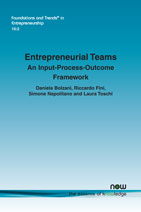Entrepreneurial Teams: An Input-Process-Outcome Framework
By Daniela Bolzani, Università Cattolica del Sacro Cuore, Italy, daniela.bolzani@unicatt.it | Riccardo Fini, University of Bologna, Italy, riccardo.fini@unibo.it | Simone Napolitano, University of Bologna, Italy, simone.napolitano@unibo.it | Laura Toschi, University of Bologna, Italy, laura.toschi@unibo.it
Abstract
Entrepreneurship research emphasizes the importance of the individual entrepreneur in both venture creation and growth. However, theory and practice suggest that the vast majority of new ventures are now team-based, and teams play a key role in venture success. As the scholarly interest in this topic has substantially grown in the recent years, the literature has flourished in a rather fragmented way. In this paper, we take a holistic view and systematise more than 250 papers on entrepreneurial teams, published over 30 years. We use a process approach (i.e., Input-Process-Outcome), depicting team evolution phases, from inception to maturity, linking them to firm performance. We identify gaps, highlighting opportunities for future research.
Entrepreneurial Teams: An Input-Process-Outcome Framework
Scholarly research investigating the venturing processes by entrepreneurial teams (ETs) is relatively recent and characterized by specific and limited areas of attention. Although the authors build on earlier contributions, Entrepreneurial Teams: An Input-Process-Outcome Framework takes a nuanced view of the phenomenon. First it offers a comprehensive understanding of the construct ‘entrepreneurial team’ by focusing on its definition and characteristics. Second, it depicts team evolution phases, from inception to maturity, linking these to firm performance by using a process approach (i.e., Input-Process-Outcome).
Entrepreneurial Teams: An Input-Process-Outcome Framework is structured as follows. First, it outlines the methodology used to search the relevant literature on the topic and to create meaningful thematic clusters. Second, it presents the previous reviews on ETs and illustrate how this monograph can be differentiated from these. Third, it focuses on the ambiguity of the definition of ETs in previous research, providing its own definition of ETs and identifying areas for future development. Fourth, it presents an in-depth analysis of the 14 thematic clusters identified according to the Input-Process-Outcome framework. In each cluster, the authors review the state of the art on the topic, highlighting limitations and shortcomings. For ‘inputs,’ they review papers dealing with individual/team characteristics and ET formation. For ‘processes,’ they review papers dealing with development and turnover in ETs, ETs and cognition, interactions in ETs, ETs and networks, and, finally, ETs and governance/organization, strategies, and opportunity identification. For ‘outcomes,’ they review papers dealing with ETs and new firm creation, legitimacy, fundraising, public support, internationalization, and performance. It concludes by identifying opportunities for further research and offers some suggestions on how to contribute to the state of the art of literature.
